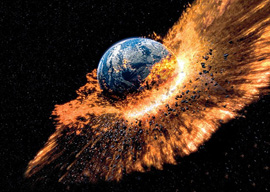
December 30, 2011

Things aren’t looking too good these days, says Slavoj Zizek in his latest book, Living in the End Times.
The underlying premise of the present book is a simple one: the global capitalist system is approaching an apocalyptic zero-point. Its “four riders of the apocalypse” are comprised by the ecological crisis, the consequences of the biogenetic revolution, imbalances within the system itself…and the explosive growth of social divisions and exclusions.
What the devil could he mean by “apocalyptic zero point”—a revelation, a revolution, a shift, an exhaustion, an implosion, an explosion?
[W]e are bombarded from all sides with injunctions to recycle personal waste, placing bottles, newspapers, etc., in the appropriate bins. In this way, guilt and responsibility are personalized—it is not the entire organization of the economy which is to blame, but our subjective attitude which needs to change.
He calls it an “ideological trick,” and it’s one of the oldest in the book. As personalized guilt was a hallmark of Christianity, diffused responsibility is one of democracy’s trademarks.
Badiou was right to claim that today the name of the ultimate enemy is not capitalism, empire, exploitation, or anything similar, but democracy itself. It is the “democratic illusion,” the acceptance of democratic mechanisms as providing the only framework for all possible change, which prevents any radical transformation of capitalist relations.
How radical were some of these so-called transformations? Were they revolutions blowing the whole thing to smithereens, seminal events setting new patterns, or merely vents allowing the system to blow some steam and keep going?
Zizek walks us through the last half-century’s successive insurrections. May ’68 failed politically but won socially with its loosening of mores. The anti-communism revolts of 1989 won politically as communism collapsed, but they lost socially. He says “the new post communist society with its combination of wild capitalism and nationalism is not what the dissidents were fighting for.” He dubs this year’s London riots as “pure irrational revolt without any program.”
Like the steam engines that launched it and that it launched, the system—call it industrial, capitalist, or democratic—is well supplied with safety valves (or in psychoanalytical terms, defense mechanisms).
After taking a line from quantum physics, Zizek compares our current situation with Elisabeth Kübler-Ross’s five stages of grief—denial, anger, bargaining, depression, and acceptance—which he uses as chapter headings for his book.
Who died, though? A particular idea of what constitutes revolution? And is it such a sad thing that the hedge of piques and bayonets has turned to pointed fingers? They’re pointing rather lamely—not being as sharp, they’re not as fatal.